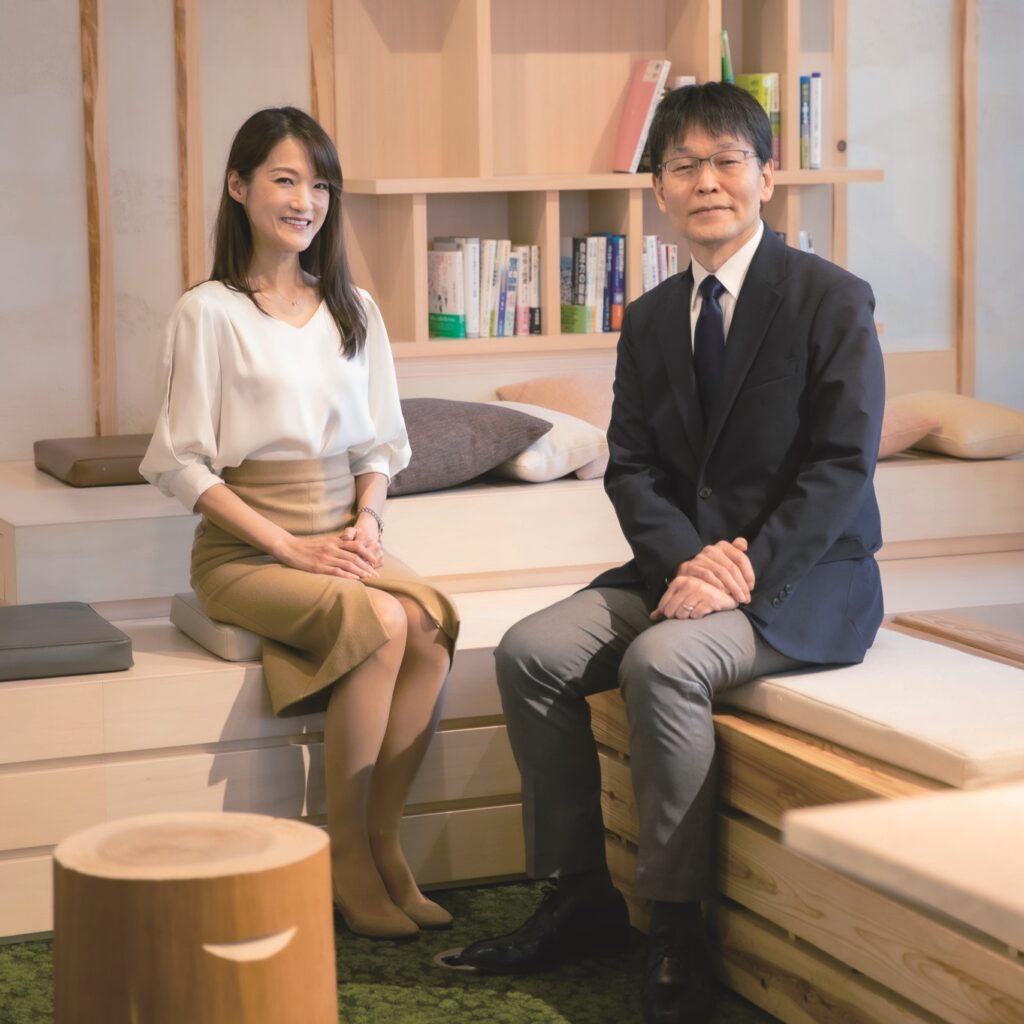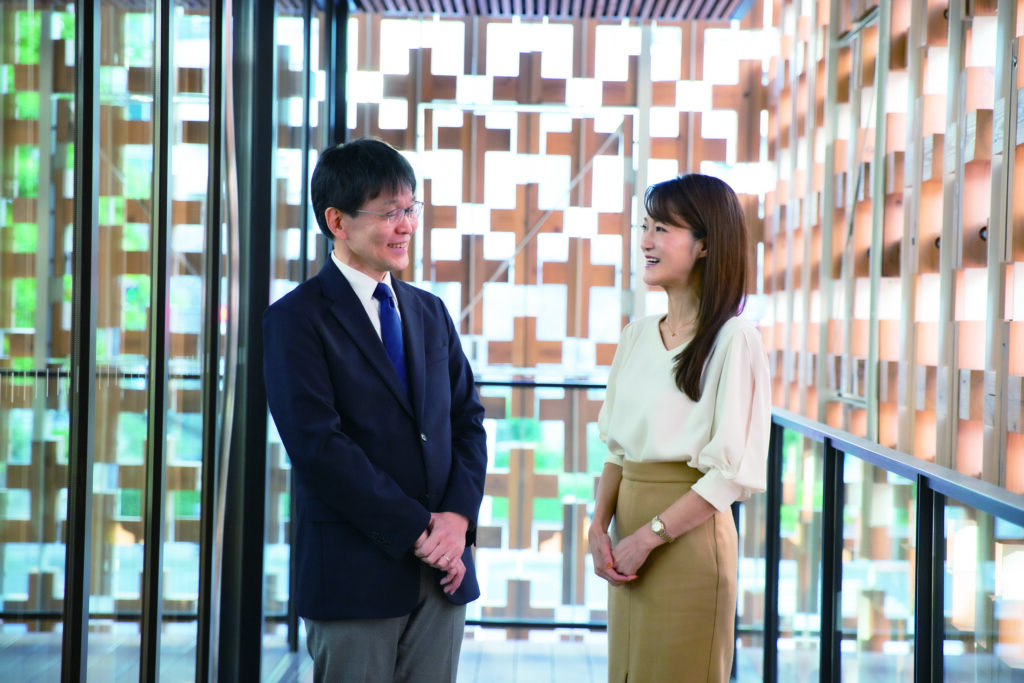Follow your heart: Discovering new goals on the path forward

Professor Amikura talks with Chongfa Min, a Sophia graduate who left a strong impression on him as one of his seminar students. The article is filled with tips for carving out your future such as seminars, careers, and the importance of continuing to learn.
I was a new graduate but entered a company as a mid-career recruit. (Min)
Hisanaga Amikura Long time no see! How have you been? Today, I’ve brought the document you submitted for the seminar admission interview as my secret weapon.
Chongfa Min You still have it? Let’s see… I wanted to join the seminar because “I always wonder why a particular product or artist becomes popular. I have enjoyed your class, and I cannot think about joining any seminar but yours because your seminar will offer case studies like these.”
Amikura Now that I read it, it’s quite flattering. I think you are right on your self-assessment. You are the kind of person who will keep trying once you set a goal and see the path towards it.
Min I simply want to try only the things that I want to do. This was true for my job-hunting process too. I sent application forms only to an advertising agency and a publisher. I graduated in 2001, which was in the middle of the so-called employment ice age. On top of that, because I had narrowed down my choice of industry so much, I couldn’t find a job at all. That was when I found out that an advertising agency was accepting mid-career job applications, so I sent my application form with my graduation thesis attached.
Amikura I imagine you promoted yourself like, “Your company will regret it if you didn’t hire me,” right? Students in my seminar typically find the company they want to join on their own, and we did not discuss your job hunting much either. I would sometimes ask how your job hunting was going at the seminar and wish you good luck.
Min The head of the marketing department of the company I wanted to join liked my thesis, and I ended up being accepted not as a new graduate but as a mid-career recruit. I joined the company in April, and I was fortunate to join basic employee training. However, soon after, I was thrown into various tasks typical of regular company work. For example, when developing a new product, I was tasked with conducting research, starting with gathering research materials.
Amikura Didn’t you call me right after you joined the company and said, “I was appointed to a department quickly because I was a mid-career recruit, but I have no idea what I should do?”
Min Around that time, I was in the magazine department in the media division during my training. I was put in charge of editorial ads for a monthly information magazine alongside a senior colleague. Through this experience I discovered the fun of working on magazines. I was in my early 20s and was willing to try anything. I became very interested in working at a publisher and, after a year and half or so, I started to work for a wedding magazine publisher.
Amikura The secret weapon I mentioned a couple of minutes ago included your aspirations post-graduation. Back when you were in your second year and applying for seminars, you expressed interest in media-related fields. It seems you had already mapped out your path.
Min After I joined the company, I found there was a huge gap between my expectations and the day-to-day tasks I was assigned. I spent about two years there, but it wasn’t fun. When I saw my previous boss, I said my previous work was better for me. The boss promised I could return to the marketing division under a temporary employment agreement, and I decided to go back to the previous job.

It’s important to build work experience and find learning opportunities. (Hisanaga Amikura)
Amikura I think it was after you returned to the advertising agency that I asked you to take part in the university’s event in which Sophia graduates talk about their workplace experiences. I was impressed when you said, “As a super temp worker, I know everything about the company database.”
Min I learned many things when I was a new hire, and employees thought I was useful. I was appointed to a wide range of tasks, and 12 years passed before I knew it. After that, I wanted to find a company where I could work as a full-time employee and joined my current company, JP Media Direct. Working in marketing for a long time made me want to carry out statistically supported data analysis.
Amikura You showed no interest in data while you were at school, but now you understand the importance of statistical analysis using data.
Min My job involves data analysis, and I’ve come to recognize the significance of data science. However, when I attempted analysis, I encountered numerous challenges. For example, I struggled with data interpretation. Although I was tasked with leveraging data to innovate, self-teaching left me with unresolved queries. I began to wonder if a more systematic approach to learning was needed.
Amikura Then you saw the advertisement that Sophia University was opening the Graduate Degree Program of Applied Data Sciences.
Min I searched for information right away because the advertisement said that I could learn how to use data in a way that is useful for business. I told my boss in an interview that I wanted to enter the graduate school of my university, and my boss encouraged me to do it. I heard that applicants would be exempt from a written exam if they met certain conditions, so I quickly obtained business statistics certification. This is how I got in the program, and at first, the best I could do was to just keep up with the class.
Amikura Covering science, engineering, and economics is the key characteristic of this cross-disciplinary graduate degree program. You can learn the most advanced statistical analysis and at the same time learn how to apply it to business.
Min Data science is a combination of business competency, information processing capabilities, and statistical knowledge. The subject we choose depends on what we want to focus on. Since I am interested in people’s behavior and psychology, I plan to take many marketing classes. I want to use data as evidence of marketing research results.
Amikura We used to rely on experience and hunches when making decisions. Now we can collect a large amount of data, but data is just lines of numbers if you cannot make meaningful interpretations. In order to learn how to do that, it is important to build work experience and find learning opportunities in a different environment. Continuing to study will help you greatly in the future.
Life is full of new things. I want students to follow their passion. (Hisanaga Amikura)
Min Some students don’t know what they are suited to do. Even though they are hired for the job they wanted, they may find that it wasn’t the right job. This shouldn’t be the end of the story; they can change their path if they find something new to try.
Amikura Many students believe they must not fail. Some say they won’t be able to switch jobs in the future unless they are hired by a major company right after graduation. Even if they started their career just because the job sounded fun, they can change the path as many times as they want later. Life is full of new things, and I want students to follow their passion.
Min The world is changing very quickly, and we must change very quickly too. The process of such change produces personal growth.
Amikura That’s right. You used to be terrible at Excel* while at university, but now you are studying it here.
Min I find it attractive when people can tell you what they like. For example, someone who can say, “I did such and such, and I like such and such,” instead of someone who is studying for the purpose of getting hired. I want students to have fun both in job hunting and their student life because life is all about enjoyment.
*Excel is a trademark or registered trademark of Microsoft Corporation in the United States and other countries.
※Please note that the content of this article is subject as of October 2023